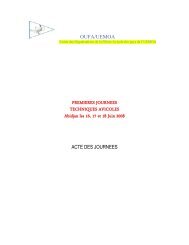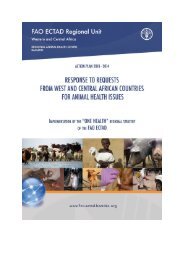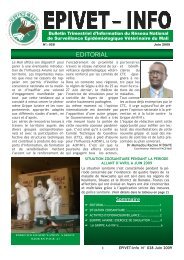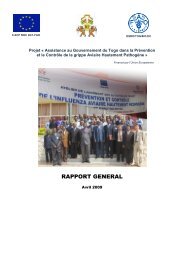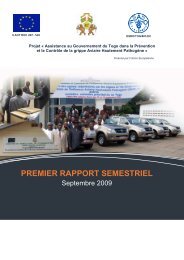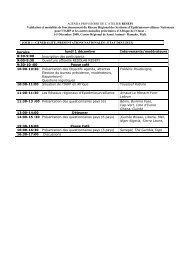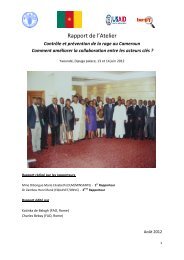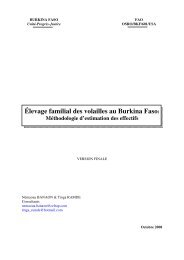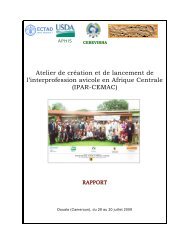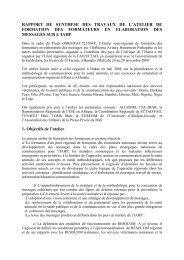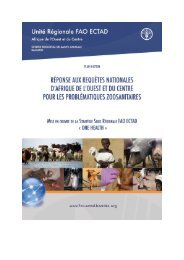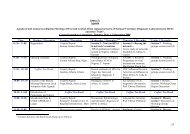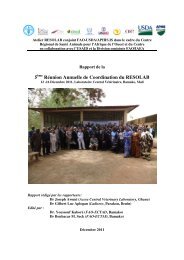RESOLAB Annual Coordination Meeting - fao ectad bamako
RESOLAB Annual Coordination Meeting - fao ectad bamako
RESOLAB Annual Coordination Meeting - fao ectad bamako
You also want an ePaper? Increase the reach of your titles
YUMPU automatically turns print PDFs into web optimized ePapers that Google loves.
Annex 3: <strong>Meeting</strong> Terms of referenceTERMS OF REFERENCE OF THE THIRD ANNUAL COORDINATION MEETINGBamako, November 30 to December 4, 2009.The arrival of H5N1 HPAI in Africa did not catch the continent's veterinary services unawares but itdid highlight their shortcomings in terms of surveillance and, in particular, disease laboratorydiagnosis. Since the early stages of the current H5N1 highly pathogenic avian influenza (HPAI)outbreak, FAO has developed, among many other things, initiatives to strengthen veterinary diagnosticlaboratories. In particular, in Africa it fostered staff training in the diagnosis of the disease and, inDecember 2007, launched through a joint FAO-USDA/APHIS workshop, within the framework of theRegional animal health centre of Bamako (RAHC), the “West and Central Africa VeterinaryLaboratory Network for the control of avian influenza and other transboundary animal diseases”(<strong>RESOLAB</strong>).The <strong>RESOLAB</strong> network immediate objectives were set to enhance the effectiveness and efficiency ofnational veterinary diagnostic laboratories, improve communication between laboratories and withnational epidemiological networks and stimulate improvement of AI laboratory diagnosis expertisewithin the region, and thereby the quality of animal diseases diagnosis. To achieve those results, thenetwork coordinators took into consideration the different development stages of the regionlaboratories. The most advanced laboratories (those with better equipment and well experienced staff)were called upon to act as models - and leaders - for the others and to technically assist/help them. The<strong>RESOLAB</strong> was formalized at its inception meeting in December 2007, during which two laboratorieswere designated as regional laboratories: the National Veterinary Research Institute (NVRI) of Vom,Nigeria, and the Laboratoire National de l’Elevage et de Recherches Vétérinaires (LNERV) of Dakar,Senegal These regional laboratories were entrusted with: (a) giving technical opinions and advice andassisting in laboratory surveillance design, if requested; (b) Assisting national veterinary laboratoriesin HPAI diagnosis; (c) Participating in neighbouring national laboratory staff training; (d) Checkingsuspected samples submitted by them; and (e) Advising national laboratories on equipment andreagents to select for use, and on good management practice and quality system implementation.The network has already held two annual meetings with Executive Managers and Head of virologylaboratories from each of its 23 laboratory members. On the basis of recommendations resulting fromeach annual meeting, an Action Plan is proposed for the following year and usually includes activitiesfor: (a) Consolidating the regional laboratory network; (b) Upgrading the diagnostic capacity ofnational veterinary laboratories; and (c) Enhancing synergy between epidemiology and laboratorynetworks and with other networks.Since its launching, the <strong>RESOLAB</strong> network has been very active in providing technical support to itsbeneficiary laboratories by organizing training, procuring standardised reagents for AI and NDVdiagnosis, conducting ring trials for AIV serology and molecular testing, developing and launching awebsite (http://www.<strong>fao</strong>-<strong>ectad</strong>-<strong>bamako</strong>.org/fr/spip.php?rubrique27), strengthening the designatedregional laboratories for AI and other TADs and by establishing at FAO-ECTAD Bamako a bufferstock of rapid diagnostic kits and essential reagents for AI and ND laboratory diagnosis. Its value hasalready been recognized in dealing with outbreaks of AI in the region and establishing links withinternational reference laboratories. A recent witness of this recognition has been the involvement ofmany virologists of the network who co-authored a recent scientific paper on Phylogenetic Analysisand Molecular Characterization of Isolates of H5N1 virus isolated in Africa from 2006 to 2008 ( PLoSONE, March 2009, Volume 4, Issue 3, e4842; www.plosone.org ). To monitor the progress and needsof the network’s laboratories, it was asked them to submit to the network coordination of quarterlyreports of their activities.For each <strong>RESOLAB</strong> annual coordination held so far, USDA/APHIS ensured the participation of the23 of head of virology laboratories of the network and of 2-3 guest speakers from USA. Other29



